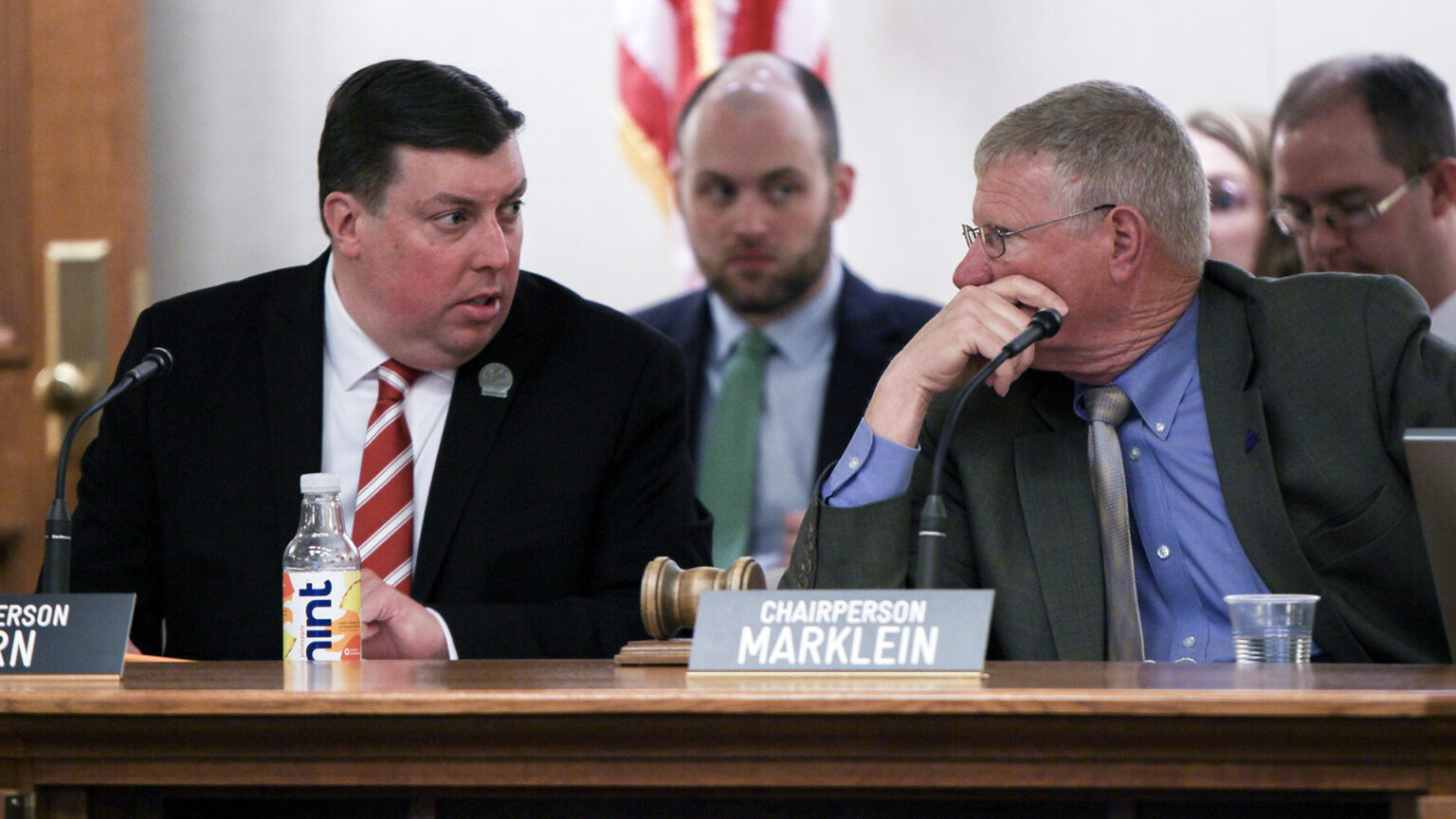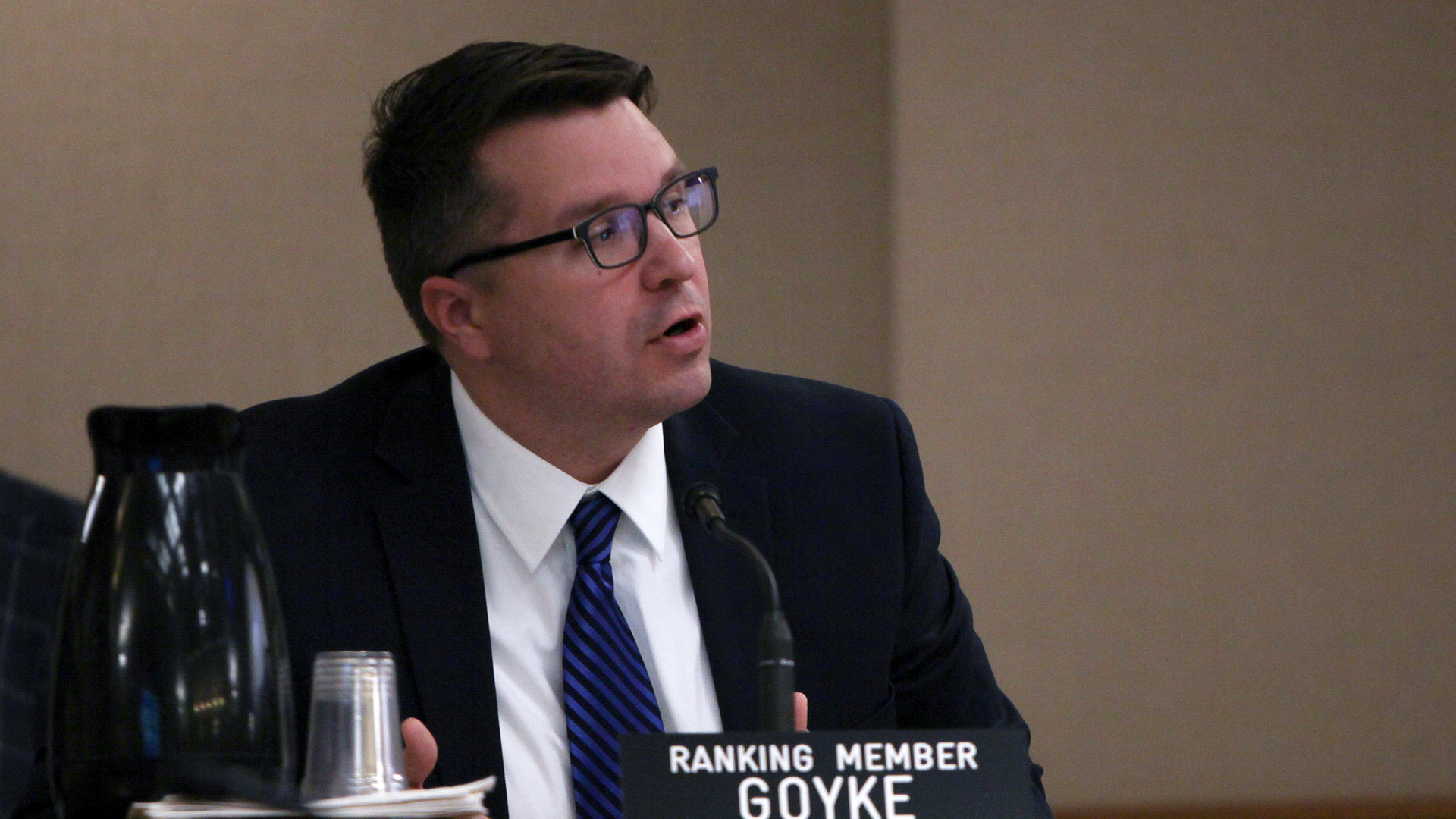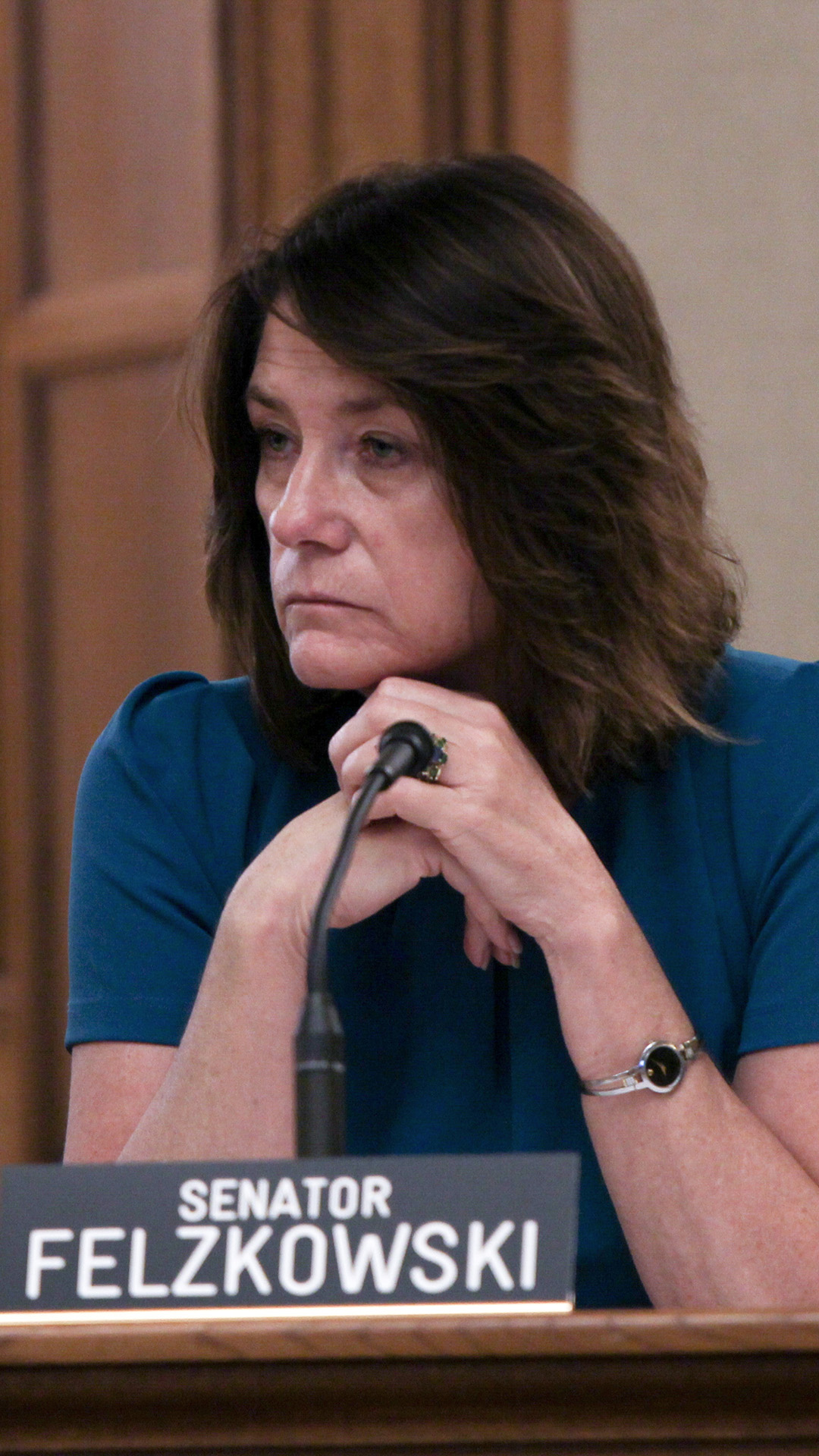Wisconsin Republicans clear out projects stalled by secretive 'pocket veto'
Gov. Tony Evers is considering next steps as conservation groups question legal authority of members of the Wisconsin Legislature's budget committee to block projects anonymously.
Wisconsin Watch
April 24, 2023

Joint Finance Committee Co-Chairs Rep. Mark Born (R-Beaver Dam), left, and Sen. Howard Marklein (R-Spring Green), right, defended the process the committee has used for decades to allow anonymous objections to agency funding requests. (Credit: Drake White-Bergey / Wisconsin Watch)

The article was first published by Wisconsin Watch.
Wisconsin’s powerful Republican-controlled budget committee, under fire for using a secretive “pocket veto” to block certain funding, denied several of those requests in a public meeting on April 18, including for one of the largest conservation projects in state history.
The abrupt about-face by the Joint Finance Committee came after Wisconsin Watch reported on how some groups have questioned the legality of the committee not setting a date for a public meeting to review the projects halted by anonymous committee members.
On April 19, Democratic Gov. Tony Evers criticized Republicans for using a “secret process” to block projects and said his administration was considering next steps.
The JFC has oversight over state agency expenditures including land conservation deals over $250,000 and in the northern part of the state. By law, committee members have 14 days to object after receiving a request for their approval, after which a meeting must be scheduled.
But in recent months the committee has come under scrutiny after Wisconsin Watch detailed its longstanding practice of exercising a pocket veto to kill projects without holding a meeting. A legal memo obtained through a records request found legislative attorneys doubted the legality of withholding funding for months, even years, without scheduling a meeting.
On April 18, with barely 24 hours’ notice, the co-chairs called a meeting to review five projects that had been held up by anonymous objections, one for nearly two years.
One by one the proposals failed on party-line votes on a committee where Republicans hold a 12-4 majority. In a meeting that lasted less than 40 minutes — and as is common included no public testimony — the Republicans voted to block:
- $4 million in state funding to leverage a federal match to close a $15.5 million deal that would conserve from development 56,259 acres around Pelican River for public recreation and logging;
- $17.5 million for a program to increase COVID-19 vaccination rates for low-income Wisconsin residents;
- The Department of Health Services from plugging a budget hole using several revenue sources, including $2.3 million from the sale of five surplus parcels of land at its Northern Wisconsin Center in Chippewa Falls;
- $1.7 million for the Department of Natural Resources to hire a full-time employee for four years to help implement state obligations under the Great Lakes Compact;
- $288,000 for a Wisconsin Economic Development Corp. tax credit to remodel a historic fraternity house in Madison.
Conservation groups said after the hearing that the JFC’s meeting to clear out a backlog of objections did not go far enough to satisfy the law.
“Because they failed to schedule that meeting within their 14-day passive review window, they don’t have any legal authority over the expenditure,” said Charles Carlin of Gathering Waters, an umbrella group of land trusts in Wisconsin. “So the ball is really back in the DNR’s court.”
Evers has proposed ending anonymous objections but has so far resisted calls to either challenge the JFC in court or allocate funds it had held up without a hearing.
“I’m not sure what’s next. We’re taking a look at that,” he said Wednesday at an event at a union training center in Fitchburg. “Obviously, we’re disappointed in the Joint Finance Committee’s response and why it took so long, why it’s a secret process and then suddenly a decision is made. That said, we’re looking at alternatives.”
Has committee violated law?
Conservationists have argued that repeated objections have threatened the health of the Knowles-Nelson Stewardship Fund. Some groups have proposed more modest conservation projects that are too small to trigger JFC oversight.
Rep. Evan Goyke, D-Milwaukee, a committee member and vocal critic of what he called a lack of transparency, said the committee’s leadership has been feeling pressure.
“I think they wanted to remove everything that’s been sitting there for a long time because they’re not in compliance with the law,” Goyke told Wisconsin Watch shortly after the meeting.
Goyke commended several Republican members — including committee co-chair Sen. Howard Marklein, R-Spring Green — for revealing that they had lodged anonymous objections and explained their reason.

State Rep. Evan Goyke (D-Milwaukee) commended Joint Finance Committee members for holding a meeting on funding requests that had been languishing for months without a hearing. (Credit: Drake White-Bergey / Wisconsin Watch)
Marklein said over the years, the DNR had brought proposed acquisitions or easements with inflated appraisals that were later reduced in price after the committee objected.
“I know I’ve saved the state of Wisconsin a lot by objecting and by getting a better deal, better appraisal and in scoping the project,” Marklein said.
Fellow co-chair Rep. Mark Born, R-Beaver Dam, defended the committee’s ability to stall projects discreetly while the committee seeks more information.
“Sometimes it’s just getting our questions answered — it’s that simple,” Born said.
Some conservation projects sail through — some die
In recent weeks, a 195-acre acquisition in Vilas County sailed through without objection —as did a 76-acre Mississippi River bluffs conservation easement in Pierce County.
But on Tuesday, several Republicans said town governments opposed the Pelican River project, and local officials only received the minimal notice of one of the largest conservation deals in state history. However, a tally by WXPR found a mix of support and opposition among the 21 nearby town governments.
“I basically went to the co-chairs and asked them as well as some of the representatives to vote this down,” Sen. Mary Felzkowski, R-Irma, told reporters after the meeting.
She had been an outlier on the committee after revealing herself as one of the lawmakers behind the objection.

State Sen. Mary Felzkowski (R-Irma) explained her objection to a request for state stewardship funding for a Pelican River Forest conservation project at a Joint Finance Committee meeting on April 18, 2023. She said town objections had been ignored. (Credit: Drake White-Bergey / Wisconsin Watch)
“Getting some of this criteria unearthed is — in a very strange and terrible way — a step forward,” Goyke said. “Because even though the process is clearly going to continue, at least we’re hearing more from the majority party about what they’ve done, why they’ve done it and who’s behind it.”
Evers has so far proposed in the 2023-25 state budget legislative changes that would remove some anonymous objections. But those tweaks would have to be approved by the JFC as part of its budget review.
Does new court majority change equation?
The door remains open for a potential legal challenge arguing the JFC has long flouted the law in a practice that goes back decades. The door may even open wider on Aug. 1 when liberals take a majority on the Wisconsin Supreme Court, which would have final say on whether the committee’s actions were legal.
Conservative justices, who have controlled the court for the past 15 years, have often sided with the Republican Legislature. But Born said the changing legal landscape was not why the committee convened a “routine” meeting on April 18.
“We are only continuing the work of the committee as it has been done for decades,” he told reporters. “There is no new concern or new thing that’s changing the way we’re doing our job.”
The clearing of the backlog didn’t last long.
Less than an hour after the meeting concluded, DHS was informed that its plan to spend $8 million of the state’s opioid settlement fund on expanded Narcan, fentanyl test strips and prevention education in public schools had received an anonymous objection from a JFC member.
The letter sent out to the agency didn’t specify when or why the objection was raised. It only said a meeting would be scheduled — at a future date.
Wisconsin Watch Statehouse Bureau Chief Matthew DeFour contributed to this report.
The nonprofit Wisconsin Watch collaborates with WPR, PBS Wisconsin, other news media and the University of Wisconsin-Madison School of Journalism and Mass Communication. All works created, published, posted or disseminated by Wisconsin Watch do not necessarily reflect the views or opinions of UW-Madison or any of its affiliates.
 Passport
Passport











Follow Us